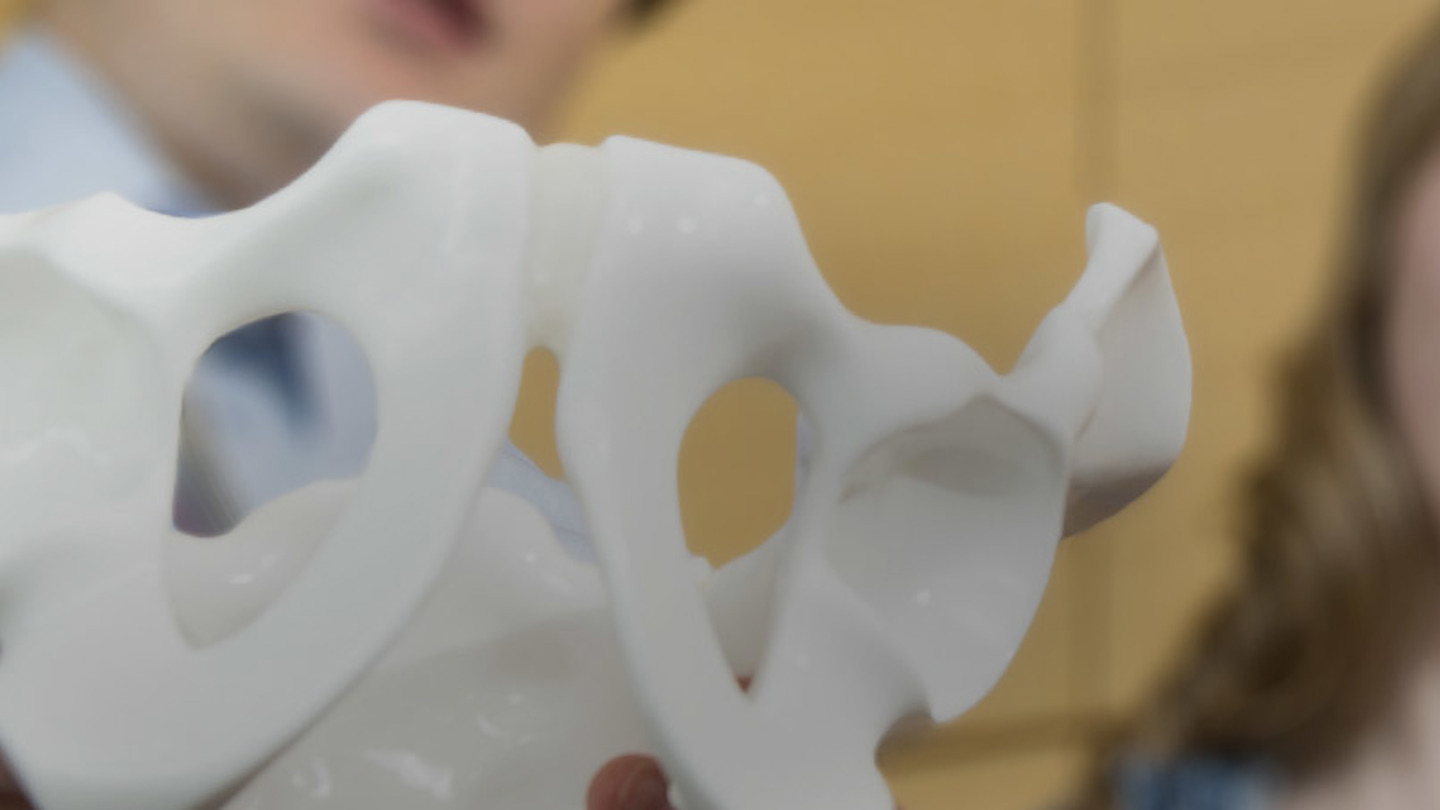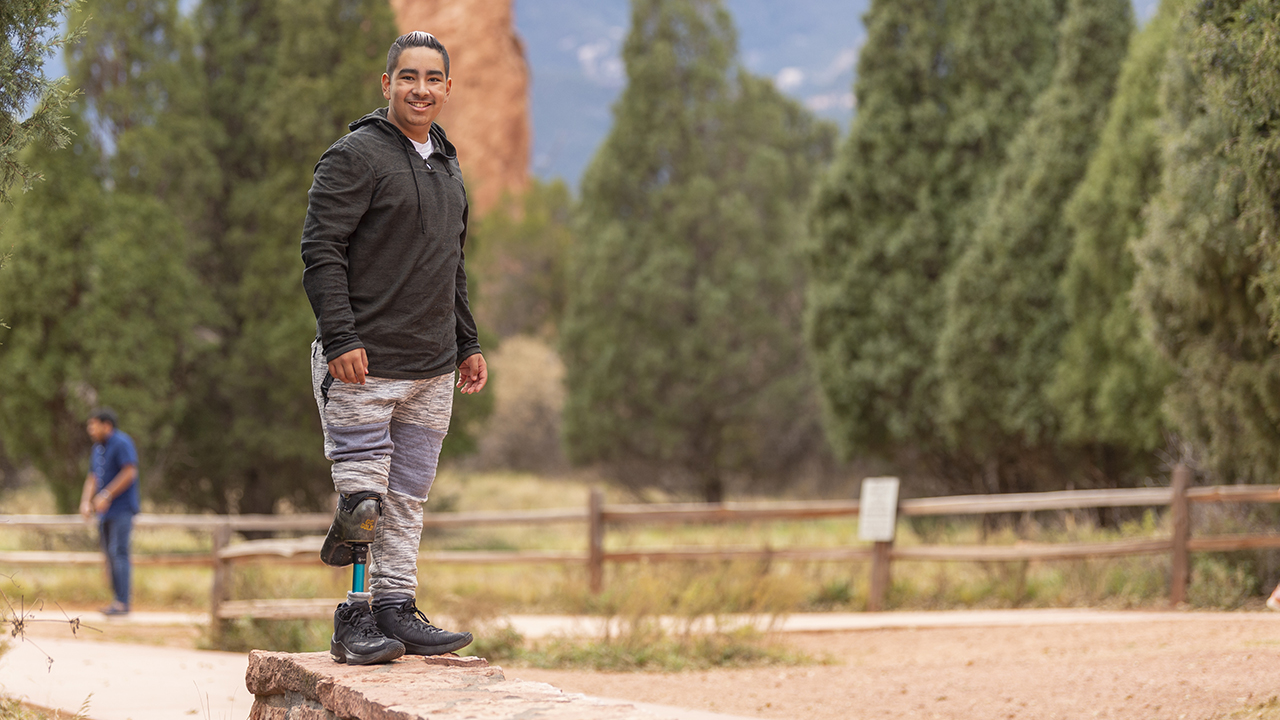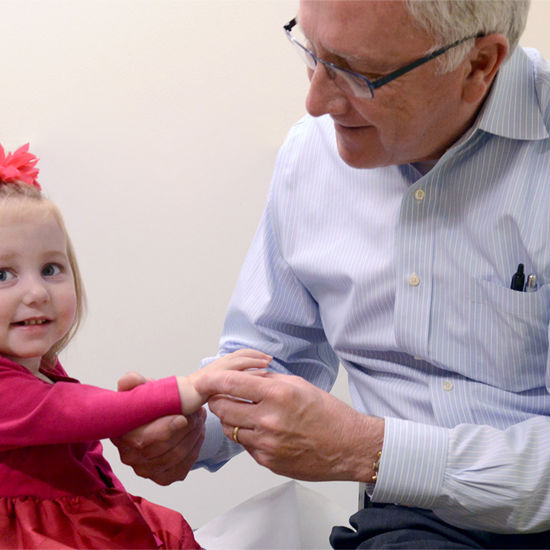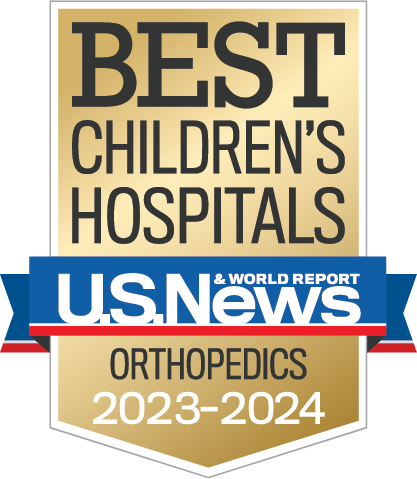- Doctors & Departments
-
Conditions & Advice
- Overview
- Conditions and Symptoms
- Symptom Checker
- Parent Resources
- The Connection Journey
- Calm A Crying Baby
- Sports Articles
- Dosage Tables
- Baby Guide
-
Your Visit
- Overview
- Prepare for Your Visit
- Your Overnight Stay
- Send a Cheer Card
- Family and Patient Resources
- Patient Cost Estimate
- Insurance and Financial Resources
- Online Bill Pay
- Medical Records
- Policies and Procedures
- We Ask Because We Care
Click to find the locations nearest youFind locations by region
See all locations -
Community
- Overview
- Addressing the Youth Mental Health Crisis
- Calendar of Events
- Child Health Advocacy
- Community Health
- Community Partners
- Corporate Relations
- Global Health
- Patient Advocacy
- Patient Stories
- Pediatric Affiliations
- Support Children’s Colorado
- Specialty Outreach Clinics
Your Support Matters
Upcoming Events
Child Life 101
Wednesday, June 12, 2024Join us to learn about the work of a child life specialist, including...
-
Research & Innovation
- Overview
- Pediatric Clinical Trials
- Q: Pediatric Health Advances
- Discoveries and Milestones
- Training and Internships
- Academic Affiliation
- Investigator Resources
- Funding Opportunities
- Center For Innovation
- Support Our Research
- Research Areas

It starts with a Q:
For the latest cutting-edge research, innovative collaborations and remarkable discoveries in child health, read stories from across all our areas of study in Q: Advances and Answers in Pediatric Health.

About the Amputee Program
Our team of orthopedic specialists within the Amputee Program at Children’s Hospital Colorado focuses on the evaluation and treatment of children with limb differences of the arms and legs. These differences can be congenital, meaning they are present at birth, or they can develop later in life from incidents like trauma or cancer. Our care team will evaluate all possible treatment options and discuss these recommendations with you. This may include limb reconstruction, limb sparing or amputation.

Amputee Program services:
- New and follow-up evaluations
- Prenatal evaluations
- Comprehensive imaging, including EOS X-rays that reduce a child’s exposure to radiation
- Physical therapy and occupational therapy
- Surgical care
- Consultation with a collaborating prosthetist
- Counseling for families considering limb sparing, lengthening or amputation surgery
- Counseling for families considering adoption of a child with an amputation or limb difference
- Opportunities for patients and families to participate in ongoing research
- Access to peer groups and families who have been through similar experiences
- Access to community organizations and resources
Why choose our Amputee Program
Our program is nationally recognized for its clinical expertise, personalized care and strong surgical outcomes. Our multidisciplinary clinic team spans a variety of specialties including orthopedics, rehabilitation, physical therapy, occupational therapy and prosthetics. These experts work together to craft individualized treatment plans for each patient. Additionally, our clinic team includes active members of the Association of Children’s Prosthetic-Orthotic Clinics.
In certain cases, we work with our Center for Gait and Movement Analysis to receive additional information.
Parents often question if amputation is required, and the answer varies. But when amputation is recommended as a treatment option, it’s typically because our care team feels amputation will give a patient the highest quality of life. This often means reduced pain and a decrease in the number of additional surgeries.
We counsel patients and their families during the decision-making process. This gives families time to talk through the advantages and disadvantages of surgery. It also gives them the opportunity to connect with other families who’ve been through a similar surgery. In general, the process can help families arrive at a decision that feels right for them.
After surgery, we work to educate patients and families on how to improve quality of life. We also provide patients with information about activities and programs that can help them lead an active, healthy lifestyle.
Amputation-related conditions we treat
Our amputation clinic treats a variety of conditions and is also equipped to provide consults or second opinions. This can include congenital and acquired limb amputations and deficiencies, as well as congenital pseudarthrosis.
Amputee resources for patients and families
When your treatment plan includes an amputation recommendation, we strive to answer all your questions as thoroughly as possible so you can make an educated care decision for your child. In addition to the information we provide at your appointments, the following resources may help.
Deciding on surgery
Does my child need to have an amputation?
If we present an amputation as a treatment option for your child, it is because we feel that an amputation will help your child be as highly functioning as possible, including relieving their pain and reducing the number of surgeries that they may have to endure. We will always discuss all treatment options with you.
Do you provide prenatal counseling?
Yes, we provide prenatal counseling for families who are facing this difficult situation. We highly encourage you to come in for an appointment with any information you’ve obtained from your OB/GYN. We are happy to discuss their findings along with what to expect when the baby is born, and more importantly, what to expect as they develop.
It seems like an amputation is the best option for my child, but there are several different options available. How do I decide which to choose?
Every situation is unique, and your treatment team will go over all the options with you. We recommend you consider these factors:
- Which option is likely to be the most comfortable for your child?
- Which option gives your child the most function?
- Which option will you and your child feel most comfortable with in terms of appearance?
I don’t know anyone who has had an amputation. Is it possible to meet someone and ask them some questions to better understand what their life is like?
Absolutely. We encourage this and actively try to facilitate it. Several of our current and prior patients welcome contact from families in this situation. We also hold an amputee fair so that possible amputee patients can meet current amputee patients and their families. If either of these options interests you, ask us for more information.
What to expect from surgery
Will my child be asleep for the procedure?
Your child will be asleep. An anesthesiologist will meet with you and your child before the procedure to discuss going to sleep before the surgery and waking up afterward. The anesthesiologist may also discuss options for controlling your child’s pain after surgery.
Will my child need to stay in the hospital after the procedure?
A one-night stay at the hospital is typical, but additional time may be necessary depending on your child’s situation. For your child to return home, we will need to make sure they are not having trouble eating or drinking, are responding well to their medications and are able to perform specific movements. Your treatment team will give you an estimate of how long your child’s hospital stay might be.
Recovery
Will my child need to use a wheelchair or crutches?
If the procedure is on one of your child’s legs, they will likely need to use crutches or a wheelchair for a period of time. This is because your child’s skin and other tissues need to heal before they can use a prosthesis.
Will my child need physical therapy after the procedure?
Your child will likely need some physical therapy after the procedure, and a Children’s Colorado physical therapist will be a part of your care team.
I’ve heard that some people can still feel like they have the body part after an amputation. Is this normal?
This is normal, and it’s called a phantom sensation. Not all patients experience it, but many do for a period of time. If this sensation is uncomfortable for your child, speak with your treatment team about options.
Prosthesis
When will my child get a prosthesis?
Most patients will start the process for obtaining a prosthesis approximately four to six weeks after surgery, but the exact timeline may depend on how well your child is healing from surgery.
How does a prosthesis stay on?
The fit of a prosthesis and the way the device stays attached to the leg is different for everyone. There are many ways to fit a prosthesis to your child’s leg, and your prosthetist will discuss options with you.
How difficult is it to get the prosthesis to fit correctly?
In most cases, your child will need one or two doctor visits for X-rays, and a few visits to the prosthetist for construction of the device. These appointments will help ensure a quality fit for your child. If your child has a more complex medical condition, this process can take longer. In growing children, prostheses need to be evaluated at least once a year.
Are bionic prostheses available that can make my child like they were prior to the amputation?
Many different types of prostheses are available. Your child’s doctor, prosthetist and therapist will work with you to choose the prosthesis that best suits your child’s current needs and their future goals. No prosthesis has the full abilities of a natural limb, but there are prostheses available that allow for full participation in normal childhood activities.
Life after amputation
What physical activities and support groups are available for people with disabilities?
There are many organizations that specialize in teaching children with disabilities and their families about activities, events and outings. Take a look at our list of organizations included on this webpage.
What follow-up care should we expect after an amputation?
Follow-up care for your child is specific to the surgery we perform. We have a multidisciplinary clinic available once a month at our location on Anschutz Medical Campus. During this clinic appointment, your care providers from orthopedics and rehabilitation, therapy and prosthetics will discuss next steps with you and your child.
- Adaptive Recreation for Childhood Health, or ARCH, offers year-round programs for kids, teens and young adults with physical disabilities. ARCH’s main initiative is its ski program, held at Winter Park Ski Resort. Participants learn to ski, meet friends, build confidence, and, most importantly, have fun. ARCH also offers golfing, fishing, biking, tennis and much more. Call 720-777-6590 for more information.
- Adaptive Adventures in Evergreen, Colorado, offers a variety of programs for people of all ages who are injured. Programs include cycling, handcycling, kayaking, mountain biking, rafting, skiing, mono-skiing, Nordic skiing, adaptive Nordic skiing, waterskiing and sit waterskiing. Contact Matt Feeney or Joel Berman at 866-679-2770 or info@adaptiveadventures.org.
- Adaptive Action Sports provides youth and young adults living with permanent physical disabilities the opportunity to learn and be involved in skateboarding, snowboarding and other action sports. A variety of camps are available throughout the year. If needed, partial scholarships are available to help with expenses. Call 760-846-1076 for more information.
- The Amputee Coalition is the nation’s leading organization on limb loss, dedicated to enhancing the quality of life for amputees and their families, improving patient care and preventing limb loss. It is a great way for kids to meet other kids who are in the same situation and obtain a better understanding of how to live life with an amputation.
- The Challenged Athlete Foundation, or CAF, offers a variety of opportunities and support to people with physical disabilities so they can pursue active lifestyles through physical fitness and competitive athletics. This helps increase self-esteem, independence and quality of life.
- Footprints Adventures offers a variety of camps for teens or adults who are living with an amputation. These camps offer fun in nature with activities like rock climbing, camping, rafting and much more. Call 720-445-5238 for more information.
- LIM359, short for Living in Motion 359 Days a Year, is a Denver support group for people with limb loss and limb differences. The organization’s mission is to bring people together to share past, present and future experiences through participation in group activities. Various activities are available monthly, like bowling nights, Jazz at the Park, picnics and community events. Contact Emily at 571-215-5465 or livinginmotion359@gmail.com for more information.
- National Sports Center for the Disabled, or NSCD, is one the largest outdoor therapeutic recreation agencies in the U.S. It provides year-round programs for people of all ages with a variety of disabilities, including alpine skiing, cross country skiing, horseback riding, rafting, rock climbing and more. Call 303-316-1518 for more information.
- Through transformative experiences, tools and inspiration, No Barriers USA helps people embark on a quest to contribute their absolute best to the world. In the process, the organization fosters a community of curious, brave and collaborative explorers who are determined to live the No Barriers Life.
- United Access is a company that offers something essential to people with disabilities: the ability to drive or ride in a vehicle. The organization partners with industry-leading manufacturers to supply its dealerships with the best and safest products, including wheelchair accessible vans, trucks and SUVs, wheelchair lifts and scooter lifts, hand controls, power transfer seats and more.
- The University of Colorado Hospital’s Amputee Support Group offers resources and support for patients and their family, friends and supporters. The group meets once a month. Call 720-848-2041 for more information.
Other online resources
- U.S. Paralympics: provides information about U.S. Paralympics, including who the athletes are, what they do and how you can get involved
- Kyle Maynard: a motivational speaker and ESPY award winner with congenital quadrimembral limb loss
- Aimee Mullins: a double amputee, Paralympic athlete and motivational speaker; watch Aimee’s TED Talks The Opportunity of Adversity and It’s Not Fair Having 12 Legs
- Lacey Henderson: a Paralympic athlete
- Gimp Monkeys: a video about a group of climbers with disabilities in Colorado
- Zach Hodskins: a story and video about an outstanding basketball player and student who is a single-arm amputee
- Giles Duley: a triple amputee who continues to dedicate his life to telling stories through photography
- Vasu Sojitra: an adaptive skier who ventures out into the backcountry to summit peaks, explore avalanche zones, send cliffs and ski deep powder lines — all completely unassisted
- Blueprint for a Better Human Body: an article about the future of prosthetics
- 3D printing in animatronics: 17-year-old inventor Easton LaChappelle is creating robotic limbs with strength and dexterity beyond human
Northern Colorado
Orthotic Prosthetic Solutions (OPS) - Fort Collins Office
1015 Robertson St., Fort Collins, CO 80524
Phone: 970-484-8388
Fax: 970-419-8870
QUORUM PROSTHETICS - Windsor Office
561 Garden Drive, Windsor, CO 80550
Phone: 970-686-2266
Fax: 970-686-8823
Orthotic Prosthetic Solutions (OPS) – Longmont Office
1446 Hover Road, Longmont, CO 80501
Phone: 720-652-0100
Fax: 720-652-0202
Toll free: 866-484-8388
Denver
P&O Group Pediatric Specialist - Colorado
Children's Hospital Colorado
13123 E. 16th Ave., Aurora, Colorado 80045
Phone: 303-400-8866
Fax: 303-484-7255
BioDesign, Inc.
2460 W. 26th Ave., #175C, Denver, CO 80211
Phone: 303-477-7044
Fax: 303-477-7621
Open Bionics
1514 Curtis St, suite 200, Denver CO, 80202
Phone: 720-417-8698
Rise Prosthetics - Colorado Boulevard Office
2425 S Colorado Blvd, Suite 100, Denver, CO 80222
Phone: 303-346-1906
Fax: 303-845-8607
Rise Prosthetics - Florida Avenue Office
4105 East Florida Avenue, Denver, CO 80222
Phone: 303-346-1906
Fax: 303-845-8607
Rise Prosthetics - North Office
8300 Alcott Street, Suite 105, Westminster, CO 80031
Phone: 720-484-2960
Fax: 720-535-0223
Hanger Clinic - Englewood Office
499 E. Hampden Ave, Ste 100, Englewood, CO 80113
Phone: 303-761-7800
Fax: 303-761-3722
Hanger Clinic - Parker Office
19284 Cottonwood Drive, Suite 200, Parker, CO 80138
Phone: 720-851-4216
Fax: 720-851-4996
Agile Orthopedics - Denver Metro
Servicing Denver, Aurora, Littleton, Lakewood, Arvada
Phone Number: 720-729-7266
Fax: 970-416-9359
Colorado Springs
Hanger Clinic - Colorado Springs Office
175 S. Union Blvd., Suite 370, Colorado Springs, CO 80910
Phone: 719-632-5075
Fax: 719-632-5078
Rise Prosthetics - Colorado Springs Office
245 Parkside Drive, Colorado Springs, CO 80910
Phone: 303-346-1906
Fax: 303-845-8607
Agile Orthopedics - Southern Colorado
Servicing Pueblo, Colorado Springs, Southern Colorado and Northern NM
Phone Number: 719-542-1313
Fax: 970-416-9359
Colorado - Mountain locations
Agile Orthopedics - High Country
Servicing Eagle, Summit, Pitkin and Routt counties
Phone Number: 720-739-7266
Fax: 970-416-9359
Wyoming
QUORUM PROSTHETICS - Cheyenne Office
2110 Evans Ave., Cheyenne, WY 82001
Phone: 307-778-6595
Fax: 307-778-6191
Nebraska
Orthotic Prosthetic Solutions (OPS) - Nebraska Office
1012 W. 36th St., #5, Scottsbluff, NE 69361
Phone: 720-652-0100
Fax: 720-652-0202
Toll free: 866-484-8388
Contact the Amputee Program
Our amputation clinic is a branch of our Orthopedics Institute.
For appointments at Anschutz Medical Campus or South Campus, call 720-777-6600.
For appointments at Outpatient Care at Briargate, Colorado Springs, call 719-305-9060.
Get to know our pediatric experts.

Ryan Mooney, PA-C
Physician Assistant

Sayan De, MD
Orthopaedic Surgery

Pam Wilson, MD
Physical Medicine & Rehabilitation - Pediatric, Physical Medicine & Rehabilitation

Nathan Donaldson, DO
Orthopaedic Surgery
Looking for a second opinion?
If your child has a fracture, orthopedic tumor, spinal condition, sports injury or other orthopedic condition, we can help you feel confident about their care.


Compassionate care, wherever you are
We’re here when you need us. Telehealth appointments are available across every specialty, so you can get the high-quality care we’ve always offered from the comfort, privacy and convenience of home.
See if telehealth is right for you



 We care for patients’ growing muscles, joints and bones through sports medicine, surgery, rehabilitation and research.
We care for patients’ growing muscles, joints and bones through sports medicine, surgery, rehabilitation and research.